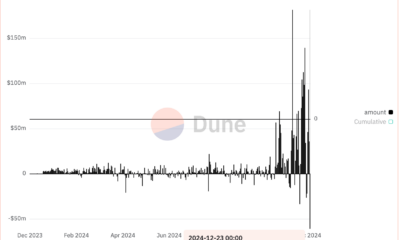funding
Story Protocol, Sorella, BSX Exchange
Published
4 months agoon
By
admin

The crypto VC community turned out for several startups this week, including Story Protocol’s $80 million series B funding round.
The week, between Aug. 18 and Aug. 24, has been buzzing with activity in the crypto venture capital space. According to crypto funding tracker Crypto Fundraising, 32 blockchain startups raked in more than $202 million from various investors in that period.
Below we look at a few of the standouts.
Story Protocol, $80 million
Story Protocol raised $80 million in its series B round. Serial crypto VC firm Andreessen Horowitz led the round, which also saw participation from Polychain Capital, Hashed, Samsung Next, and SparkLabs Global among others.
The series B round pushes the San Francisco-based startup’s total funding to $140 million and values the company at an impressive $2.25 billion.
The company aims to tackle what it considers an escalating problem of intellectual property theft, particularly in the era of generative artificial intelligence.
Story’s blockchain network allows IP owners to store their creations on the platform, embedding licensing terms directly into smart contracts.
In that way, it ensures that IP owners are compensated whenever their content is used, countering the growing concerns of technology giants using AI models to ingest copyrighted material without proper authorization.
Sorella Labs, $7.5 million
Next on the list is Sorella Labs, also a San Francisco-based startup. The company secured $7.5 million in funding to further its work to develop tools designed to identify and process maximum extractable value activities on the Ethereum (ETH) blockchain.
Research-driven tech investment company Paradigm led this particular funding round. Other participants included Nascent, Uniswap Ventures, Robot Ventures, and Bankless Ventures.
Sorella Labs plans to use the proceeds to expand its operations and speed up the development of its key products, Brontes and Angstrom.
Corn, $6.7 million
Corn is another winner in this week’s crypto VC fundraising column. The Ethereum layer-2 network, which uses hybrid tokenized Bitcoin (BTC) as gas, collected $6.7 million in a seed round led by Polychain Capital.
Binance Labs, Framework Ventures, as well as Polygon (MATIC) co-founder Sandeep Nailwal also lent a hand in the round.
Corn is reportedly looking to create a “crop circle” ecosystem that matches users, applications, and token holders, to address challenges faced by other decentralized networks, including insufficient liquidity and limited token utility.
BSX Exchange, $6.2 million
Meanwhile, BSX Exchange, a decentralized derivatives protocol built on the Ethereum L2 network Base, raised $6.2 million through pre-seed and seed funding rounds.
🚨 Exciting news! 🚨
1/ The team at @bsx_labs is excited to announce a total fundraise of $6.2M, led by @blockchaincap and 50+ additional supporters
The funding was completed to further expand BSX product development — the liquidity layer for onchain derivatives and capital… pic.twitter.com/QxYtwg1pZZ
— BSX (@bsx_labs) August 21, 2024
The seed round, worth $4 million, was led by Blockchain Capital. Other notable investors include Bankless Ventures and Maelstrom, the family office of BitMEX co-founder Arthur Hayes.
With this fresh capital, BSX plans to expand beyond derivatives trading, launching a spot aggregator in September as well as several earn-and-stake products shortly after.
Orderly Network, $5 million
Orderly Network, a project developing a web3 liquidity layer, was also on the right end of a $5 million round of funding. OKX Ventures, Manifold Trading, and Origin Protocol are among its backers.
The team behind the project plan to use the funds to bolster its capabilities in creating a permissionless liquidity layer for web3 trading across multiple blockchains.
Currently, Orderly supports six chains, including the Ethereum mainnet and Polygon. It intends to provide deep liquidity for any asset across those networks.
Other funding rounds
Wrapping up the notable VC funding rounds of the week are three projects, Soulbound, Stork Network, and Thalex. Between them, they managed to raise more than $12 million, with the web3 social gaming space getting $4 million from Animoca Brands to further its mission of empowering its new creator economy.
Soulbound is building a platform that combines GameFi and SocialFi to offer a new digital experience. The platform’s builders say they will use the money to establish gaming partnerships, grow social interactions, and expand streamer bounties as well as social questing.
On its part, Stork Network earned $4.705 million in seed funding to expand its product suite, including developing its open data market. Lightspeed Faction and Lattice co-led the round, which also saw participation from CMS and Wintermute Ventures.
Finally, Thalex, a crypto derivative exchange, raised 3 million euros ($3.3 million) in a series A extension. According to Axios, which exclusively reported on the fundraising, backers in the extended round included Bitfinex, Bitstamp and Flow Traders. IMC and Wintermute also invested in the project.
Source link
You may like


Most Layer 2 solutions are still struggling with scalability


Here’s why Stellar Price Could Go Parabolic Soon


Perp-Focused HyperLiquid Experiences Record $60M in USDC Net Outflows


Experts say these 3 altcoins will rally 3,000% soon, and XRP isn’t one of them


Robert Kiyosaki Hints At Economic Depression Ahead, What It Means For BTC?


BNB Steadies Above Support: Will Bullish Momentum Return?


Mid-December has seen a surge in crypto VC funding, headlined by Avalanche Labs’ $250 million raise.
This week marked one of the largest single investments in blockchain infrastructure this year. The period also saw significant investments across infrastructure, AI, and financial services sectors, with cumulative funding exceeding $400 million. This is close to $180 million more than last week’s fundraise.
Crypto.news collected the data from Crypto Fundraising to analyze the projects that took home the highest funds during this period.
Avalanche (Ava Labs), $250 million
- Secured $250 million in an unknown round
- Backed by Galaxy, Dragonfly, and other major investors
- Avalanche has raised a total of $540.5 million so far.
Avalanche announces a $250 million private locked-token sale led by Galaxy Digital, Dragonfly, and ParaFi Capital, highlighting the growing confidence in Avalanche’s blockchain ecosystem ahead of the Avalanche9000 upgrade 🤝https://t.co/tWmn5u9LbG
— Avalanche9000 🔺 (@avax) December 12, 2024
Nano Labs, $36.25 million
- Raised $36.25 million in private funding
- Nano Labs focuses on infrastructure and storage solutions
Klickl, $25 million
- Secured $25 million in Series A funding with $125 million FDV
- Supported by Web3PORT and Aptos Labs
- Klickl is building CEX and payment solutions
🎉 Exciting News! 🎉
Klickl has closed an oversubscribed $25M Series A funding, raising our valuation to $125M!A huge thank you to @Web3PortFund and @AptosLabs for co-leading this milestone and supporting our mission to expand global Web3 banking.https://t.co/gQpVLopzcq
— Klickl (@klicklofficial) December 10, 2024
Exabits, $15 million
- Raised $15 million in seed funding with $150M FDV
- Backed by Hack VC
- Specializing in infrastructure development
Exabits, a crypto-AI startup, raised $15M in seed funding led by Hack VC, boosting its valuation to $150M. Focused on tokenizing GPUs, Exabits aims to decentralize computing. With $20M in total funding and a 300% quarterly revenue increase amounting to $10M, Exabits is… https://t.co/oIvhRLAAJB
— Exabits (@exa_bits) December 12, 2024
Hyperbolic, $12 million
- Secured $12 million in Series A funding
- Supported by Variant, Polychain Capital, and Chapter One
- Hyperbolic has raised a total of $19 million so far.
Relai, $12 million
- Raised $12 million in Series A funding
- Relai is building Bitcoin (BTC) ecosystem solutions
- Backed by Ego Death Capital and Timechain
Waterfall Protocol, $11.6 million
- Waterfall Protocol raised $11.6 million from investors like BOLT, Alpha Token Capital.
- The firm has raised a total of $13.6 million so far.
JUST IN: Waterfall Protocol secures a staggering $11.6 million in funding to revolutionize layer 1 blockchain technology.
— Coin.News by BabyDoge (@CoinDotNews) December 13, 2024
Notable crypto VC funding rounds under $10 million
- MegaLabs secured $10 million through public sale
- Kast raised $10 million in seed funding
- Lava gathered $10 million in Series A funding
- Commonware secured $9 million in an unknown round
- Sphere Labs raised $5 million in strategic funding
- Soarchain gathered $4.5 million in an unknown round
- SmarDex secured $4.5 million in seed funding
- Fantasy top raised $4.25 million in seed funding
- AgriDex gathered $4 million in strategic round with $28.50M FDV
- Neptune Protocol secured $3.9 million in seed funding
- Spicenet raised $3.4 million in seed funding
- Glacier Labs gathered $3.37 million in public sale with $33M FDV
- Superform Labs secured $3 million in strategic funding
- Terrace raised $2.5 million in public sale with $25M FDV
- Uranium Digital secured $1.7 million in pre-seed funding
- Mandala Chain raised $1 million in pre-seed funding
- Wild Forest gathered $100,000 in public sale with $45M FDV
Read more about last week’s crypto VC funding data here.
Source link
funding
World Liberty Financial raises $30m, Partior takes home $20m
Published
3 weeks agoon
November 30, 2024By
admin

The final week of November 2024 has seen a shift toward DeFi and financial services in the crypto funding scene, with World Liberty Financial securing a $30 million investment.
The week has enjoyed cumulative investments exceeding $90 million. This is visibly less in comparison to last week’s $125 million and the previous week’s $120 million.
Crypto.news examined data from Crypto Fundraising to identify projects that raised the most capital during this period. Here’s a breakdown:
World Liberty Financial, $30 million
- The Donald Trump-backed startup raised $30 million from billionaire Justin Sun
- Sun founded the Tron (TRON) blockchain
- Sun signed on to be an adiver, focusing on DeFi and Ethereum (ETH) ecosystem development
Partior, $20 million
- Secured $20 million in Series B funding
- Received investment from Deutsche Bank
- The project develops payment solutions
- Partior raised $80 million so far.
Kernel DAO, $10 million
- Raised $10 million in an unknown round
- Backed by Binance Labs and 15+ investors
- Kernel DAO is building on the BNB Chain ecosystem
Kernel Secures @BinanceLabs Funding to Redefine Restaking on BNB Chain!
We’re proud to announce that Kernel has raised a strategic round from Binance Labs, marking a pivotal step in building the core restaking infrastructure on BNB Chain 🚀 pic.twitter.com/xc0Rot45oB
— Kernel DAO (@kernel_dao) November 25, 2024
Balance (E-PAL), $10 million
- Secured $10 million in an unknown round
- Balance develops AI-powered gaming solutions
- The project has raised $40 million so far.
Notable crypto VC funding rounds under $5 million
- Schuman Financial raised $7.36 million in seed funding.
- Avant Protocol secured $6.50 million in seed funding with a $25 million FDV.
- Talus Network gathered $5 million in a strategic round with a $150 million FDV.
- OpenTrade raised $4 million in seed funding.
- U2U Network secured $3.80 million in an unknown round.
- Rarimo raised $2.50 million in an unknown round.
- Moongate gathered $2.50 million in an unknown round.
- Bleap secured $2.30 million in pre-seed funding with a $10 million FDV.
- BRKT raised $1.75 million in seed funding.
- Margarita Finance secured $1 million in pre-seed funding.
- N3MUS raised $800,000 in pre-seed funding.
- Pulse gathered $400,000 in an unknown round.
- Girin Labs secured $300,000 in an unknown round.
Find out more about last week’s crypto VC funding data here.
Source link


OpenAI employees would be allowed to cash out their company’s share worth $1.5 billion regarding the investment agreement with SoftBank.
SoftBank, a Japanese-based multinational investment company, is financing the world’s prominent artificial intelligence (AI) enterprise OpenAI with $1.5 billion. This agreement would allow the employee to gain a profit by selling their shareholding.
Through these corporate actions, SoftBank would have a bigger stake in the company, which is something that the CEO Masayoshi Son asked for quite a long time.
OpenAI’s employees who hold the share would have spare time before the end of the year, on Dec. 24. If the employees agree, they would benefit from around $210 per share, aligned with the most recent funding.
Current and previous employees could participate in the funding, but only those who had been granted restrictions and held the share for at least two years.
OpenAI, which has been considered a non-profit organization for a decade, is denied the issue that this funding is related to the newest company’s orientations, which will move to the profit-making enterprise.
SoftBank funding for emerging technologies
According to CNBC on Nov. 27, $1.5 billion in funding for OpenAI comes from SoftBank’s Vision Fund 2.
This funding was specifically used to invest in emerging technology and companies, including Nvidia, Uber, Exscientia, Glean, Perplexity, and Poolside. Through this investment, the company based in Tokyo will expand its horizon on investing in emerging technologies like artificial intelligence.
SoftBank’s Vision Fund 2 (SVF2) was initiated in 2019 and collected an investment commitment of up to $56 billion. In 2021, funding was invested in more than 250 companies, and the majority of the funding is a new investment.
Now, the funding is focused on accelerating the use of artificial intelligence, market leaders, and companies with a value over $1 billion or who have named a unicorn.
Source link

Most Layer 2 solutions are still struggling with scalability

Here’s why Stellar Price Could Go Parabolic Soon

Perp-Focused HyperLiquid Experiences Record $60M in USDC Net Outflows

Experts say these 3 altcoins will rally 3,000% soon, and XRP isn’t one of them

Robert Kiyosaki Hints At Economic Depression Ahead, What It Means For BTC?

BNB Steadies Above Support: Will Bullish Momentum Return?

Metaplanet makes largest Bitcoin bet, acquires nearly 620 BTC

Tron’s Justin Sun Offloads 50% ETH Holdings, Ethereum Price Crash Imminent?

Investors bet on this $0.0013 token destined to leave Cardano and Shiba Inu behind

End of Altcoin Season? Glassnode Co-Founders Warn Alts in Danger of Lagging Behind After Last Week’s Correction

Can Pi Network Price Triple Before 2024 Ends?

XRP’s $5, $10 goals are trending, but this altcoin with 7,400% potential takes the spotlight

CryptoQuant Hails Binance Reserve Amid High Leverage Trading

Trump Picks Bo Hines to Lead Presidential Crypto Council

The introduction of Hydra could see Cardano surpass Ethereum with 100,000 TPS
182267361726451435

Why Did Trump Change His Mind on Bitcoin?

Top Crypto News Headlines of The Week

New U.S. president must bring clarity to crypto regulation, analyst says

Will XRP Price Defend $0.5 Support If SEC Decides to Appeal?

Bitcoin Open-Source Development Takes The Stage In Nashville

Ethereum, Solana touch key levels as Bitcoin spikes

Bitcoin 20% Surge In 3 Weeks Teases Record-Breaking Potential

Ethereum Crash A Buying Opportunity? This Whale Thinks So

Shiba Inu Price Slips 4% as 3500% Burn Rate Surge Fails to Halt Correction

Washington financial watchdog warns of scam involving fake crypto ‘professors’

‘Hamster Kombat’ Airdrop Delayed as Pre-Market Trading for Telegram Game Expands

Citigroup Executive Steps Down To Explore Crypto
Mostbet Güvenilir Mi – Casino Bonus 2024

NoOnes Bitcoin Philosophy: Everyone Eats
Trending

 3 months ago
3 months ago182267361726451435

 Donald Trump5 months ago
Donald Trump5 months agoWhy Did Trump Change His Mind on Bitcoin?

 24/7 Cryptocurrency News4 months ago
24/7 Cryptocurrency News4 months agoTop Crypto News Headlines of The Week

 News4 months ago
News4 months agoNew U.S. president must bring clarity to crypto regulation, analyst says

 Price analysis4 months ago
Price analysis4 months agoWill XRP Price Defend $0.5 Support If SEC Decides to Appeal?

 Opinion5 months ago
Opinion5 months agoBitcoin Open-Source Development Takes The Stage In Nashville

 Bitcoin5 months ago
Bitcoin5 months agoEthereum, Solana touch key levels as Bitcoin spikes

 Bitcoin5 months ago
Bitcoin5 months agoBitcoin 20% Surge In 3 Weeks Teases Record-Breaking Potential


